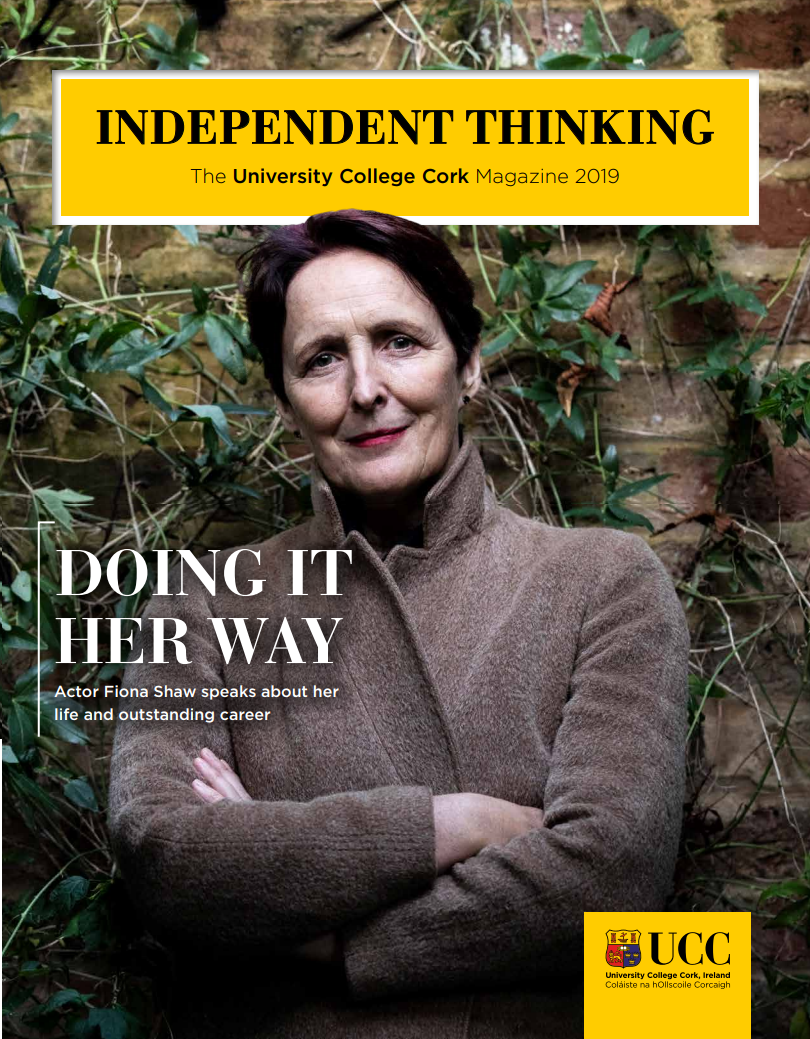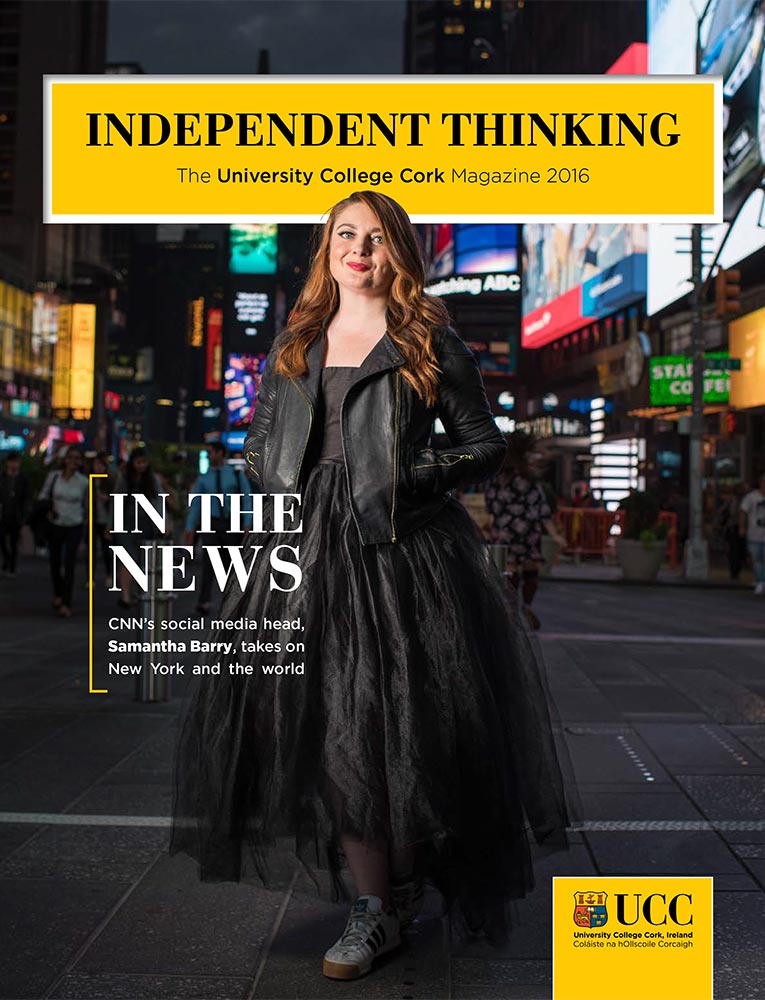Features
- UCC Springboard+: Kieran Egan
- UCC’s new Hub serves as ‘one-stop-shop’ service for 26,000 students
- Interview: Ryan Tubridy chats politics, history and his love of the arts on UCC visit
- UCC Emergency Care Society gets hands-on with life-saving skills
- Fitzgibbon Cup glory for UCC as hurlers beat IT Carlow in thrilling final
- GatewayUCC bridging the gap for research-entrepreneurs
- Pocket-sized brain injury monitor could be a game-changer for infant health
- Future of Irish hockey in safe hands with rising star Hannah
- Dr Eithne Hunt: Healthy habits for body and mind
- From Architecture to Web Development
- Nine APC Microbiome researchers make prestigious ‘highly cited’ list
- UCC honours five exceptional alumni at annual awards ceremony
- UCC spotlights four of its brightest up-and-coming female career scientists
- Rich Ferrie leads an exciting new era for UCC Innovation
- UCC honours its graduates with the official naming of the Alumni Bridge
- New UCC series explains how university research impacts daily life
- UCC's rising sports stars presented with scholarships
- UCC ranked among top universities in Europe for teaching excellence
Times Higher Education Europe Teaching Rankings 2019
- UCC makes Green Flag history…again!
The first university in the world to be awarded a fourth Green Flag
- Blazing a trail
Professor Helen Whelton charts her path to success, from curious dentistry student to global award-winner
- A Summer’s Evening on the Quad hits the right note for Cork charities
The fundraising event is now in its 14th year
- A curious mind
Paul Ross on his love of science, his greatest moments of discovery, and the exciting next chapter at APC Microbiome Ireland
- Mind your microbiome: 9 ways to boost your gut health
In honour of World Microbiome Day
- UCC hosts top wind energy experts at Cork’s largest ever conference
Scientists and engineers gathered to discuss the future of renewable energy
- Lord David Puttnam makes a passionate case for careers in the arts
He features in the latest episode of UCC’s podcast, Plain Speaking
- Funding announced for UCC SFI Research Centres
- Beekeeping makes life sweeter for Cork kids
- Saving Ireland's seals with GPS
- UCC celebrates a stellar year in sport
- Tommy Fleming headlines A Summer's Evening on the Quad
Tickets available now
- UCC ranked as global leader for sustainable social and economic impact
Times Higher Education University Impact Rankings
- Former UCC President Michael Murphy becomes first ever Irish President of EUA
Professor Murphy served as UCC President for 10 years
- MaREI researcher returns from epic adventure in search of blue whales
Dr Ailbhe Kavanagh spent seven weeks in Antarctica
- Doireann Ní Ghríofa among six new members elected to Aosdána at UCC ceremony
Writer Doireann is a UCC alumna
- Former White House drug advisor goes 'inside America’s opioid crisis'
Keith Humphreys is the latest guest on UCC's official podcast, Plain Speaking
- UCC launches Sports Strategy
Pride on our chest, belief in our heart, sport in our bones.
- How Nicole Ryan is powering change after tragedy
Alex’s Adventure
- Brainwave ‘donation’ research offers promise for dementia treatment
Research and innovation
- Full-circle for Paul as UCC extends partnership with Cork City FC
A perfect match
- Praise for The Irish Revolution as 'Atlas' documentary airs on RTÉ
Atlas of the Irish Revolution
- Pastures new
UCC launches its Food Institute
- Making waves at MaREI
Ireland's National Ocean Test Facility opens
- Research spotlight: APC Microbiome Ireland
10 researchers among Highly Cited
- Spin-out success
Atlantia Food Clinical Trials expanding stateside
- Billy Morgan: Pride of Cork
Marking a decade of UCC Sigerson Cup football
- The future is bright for soccer's Captain Fantastic
Ciara McNamara
- The next phase for rugby's rising star
Jack O'Sullivan
- RTÉ to air 'Atlas' documentary
The next step for the Atlas of the Irish Revolution
- Top business talent share their secrets to success
CUBS Conference 2019
- Green roots and flying boots: Cork Chamber project showcases ‘future’ of Cork
Future Forms is part of Cork Chamber’s 200th anniversary celebrations
- CEO and camogie star Mary O'Connor is leading change for women in sport
Moving the goalposts
- Mary Robinson is the first guest on UCC’s new podcast
Plain Speaking is now available to stream
UCC hosts top wind energy experts at Cork’s largest ever conference
Dr Cian Desmond, MaREI Research Fellow and Chair of the Wind Energy Science Conference, explains the importance of the four-day event for the future of renewable energy. In conversation with Jane Haynes
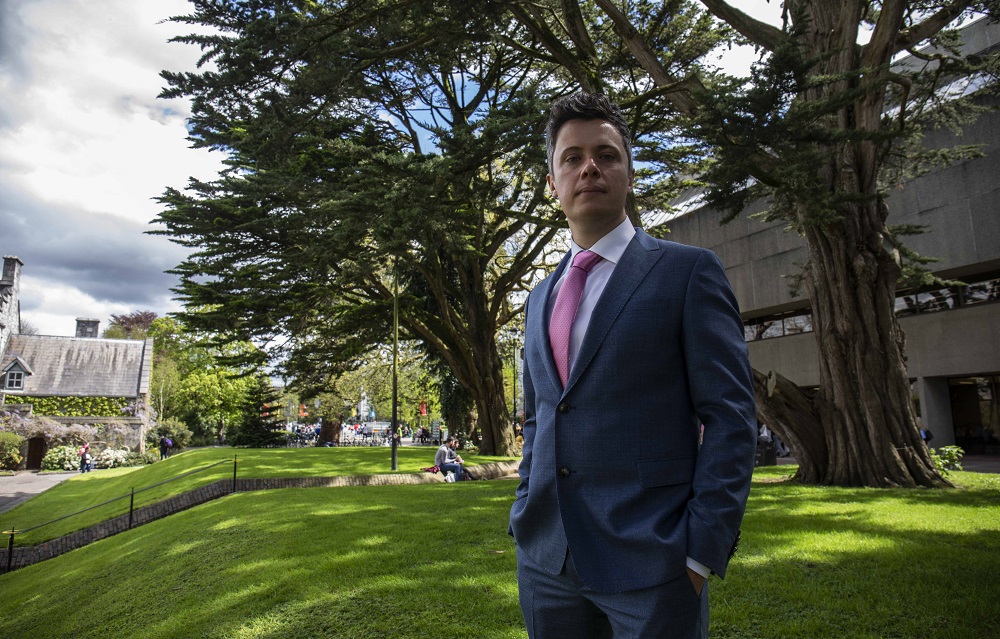
For years, many people spoke of climate change like it was some kind of urban legend; they had heard about it, it certainly sent chills down their spine, but they never actually believed they were the ones who would end up getting hurt.
Now, with climate change elevated to climate crisis, and the supporting evidence there for all to see, we find ourselves at the mercy of a most threatening and unwelcome guest.
As in any time of crisis, it’s now that we turn to the ‘doers’ in society – the people who think outside of the box, who use their skill and expertise to make a meaningful difference. This was the basis of the Wind Energy Science Conference (WESC) held in UCC this month, organised on behalf of the European Academy of Wind Energy.
The largest conference ever to be held in Cork, WESC drew over 800 leading wind energy scientists and engineers from almost 40 countries, all with the purpose of engaging in a multi-disciplinary discussion on the challenges facing the development of wind energy technologies.
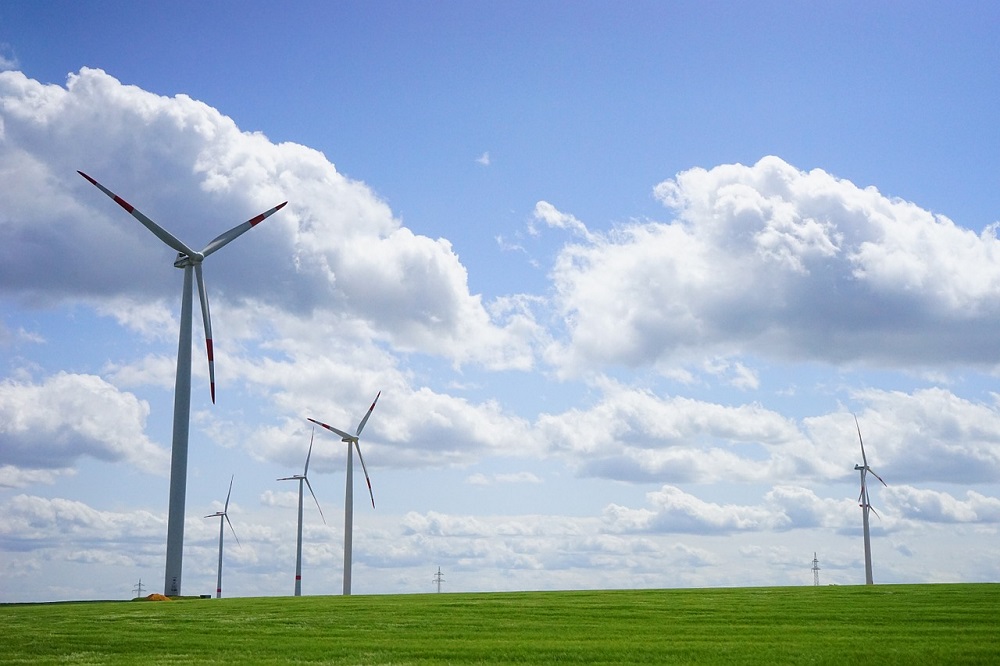
Dr Cian Desmond is Chair of WESC, and organised the four-day conference. A Research Fellow at the SFI Centre for Marine and Renewable Energy (MaREI), his work focuses on both onshore and offshore wind.
Cian’s offshore work centres upon the design and testing of floating wind turbines; onshore, he is focused on the social acceptance of renewables and, particularly, the development of support tools for community developments.
Here, Cian explains the importance of gathering the world’s top experts in wind energy on one campus:
“The aim of the conference was to create a multi-disciplinary open forum for discussion, where scientists and engineers could explore the latest developments in wind energy science, spot emerging trends, and identify future collaborators.
“In this regard, the conference was a resounding success. The science presented across the 140 sessions was state-of-the-art, and delegates really embraced the call for an open forum for discussion. Many of the delegates commented that it was the most interactive conference that they ever attended.”
“We are in a climate emergency,” he adds, soberly, “and while there are many different emerging technologies on the horizon, the problem is that we need the solutions now.
“Wind energy is the cheapest form of new (energy) generation – the technology is mature, the supply chains are developed, and we have an abundant resource in Ireland.
“The main challenge facing the development of onshore wind is social acceptance; to solve this, and other challenges hampering the development of wind, a multi-disciplinary approach is required.”
This debate on the value of educating engineers in the social sciences, organised by Bonnie Ram of Delaware Uni, was a real highlight of #WESC2019. The outcome? Such education is vital!! pic.twitter.com/in7cngBNRQ
— EAWE (@eawe_eu) June 23, 2019
The importance of getting the leading academics together on one campus, to share research and coordinate future collaborations could prove invaluable for advancements in wind energy. This was most vividly seen, Cian says, through the discussions that arose around two contentious social issues: noise and visual pollution.
“The discussions on these points were frank and informative. I am planning an opinion piece with three of the main contributors,” explains Cian. “The first part of the solution is to acknowledge that mistakes were made in the past, and to listen to the stories of those that have been impacted.”
Winning the bid to host WESC in UCC is a culmination of 10 years of research and development work by Dr Desmond and his colleagues in MaREI.
Cian, a former recipient of a Marie Curie Research Fellowship, has been heavily involved in several major projects which have allowed him to develop a robust international network. Drawing on these contacts enabled him to attract the 800+ delegates to UCC for this four-day festival of wind energy science.
More than 800 delegates from 40 countries are attending a European Academy of Wind Energy conference at University College #Cork this week. Delegates have been told that community ownership may be the solution to disputes about wind farms in rural areas. @rtenews #WESC2019 pic.twitter.com/EjepREaTcD
— Paschal Sheehy (@PaschalSheehy) June 17, 2019
One of the largest projects, currently led by the MaREI Centre, is the EU MaRINET2 initiative. As part of this initiative – an EU H2020 collaboration – almost 40 EU Marine Renewable Test Facilities are working together to accelerate the development of wind, wave and tidal energy technologies.
Other projects include the SFI-funded EirWind, focused on addressing barriers to the development of offshore wind in Ireland; and ARCWIND, an EU Interreg project aimed at adapting existing floating wind turbines to the harsh conditions of the Atlantic Ocean.
"We are in a climate emergency, and while there are many different emerging technologies on the horizon, the problem is that we need the solutions now" - Dr. Cian Desmond
Indeed, it seems location and subject matter were perfectly aligned here. Furthermore, the timing of the Wind Energy Science Conference could not have been more appropriate, falling within the same week as the launch of the Irish Government’s Climate Action Plan.
Wind energy features prominently in the Plan, with the announcement that new funding supports will be provided for foreshore and offshore wind energy. Meanwhile, the amount of electricity generated from renewable sources has now been set at a target of 70 percent (formerly set at 30 percent).
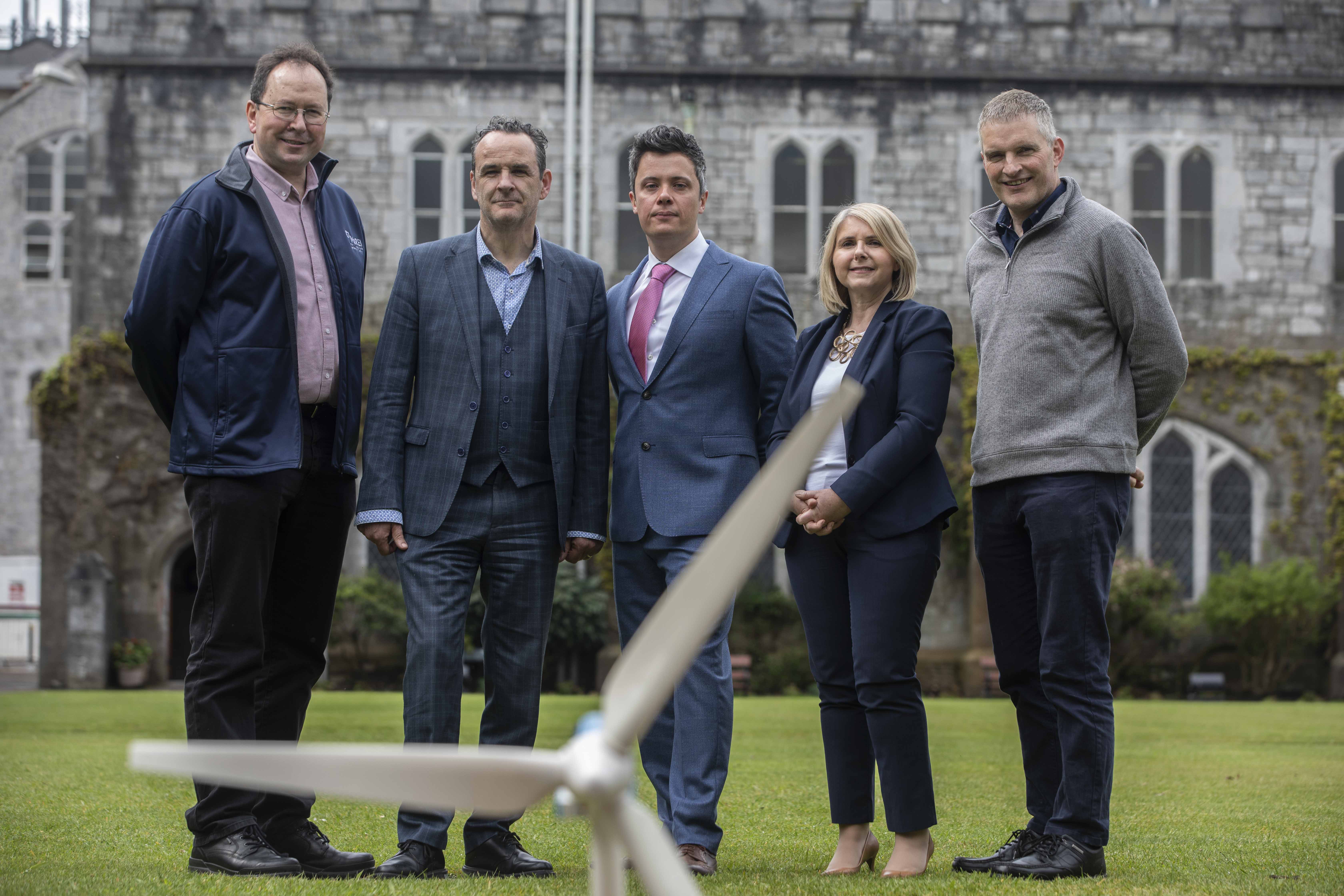
To a pioneering researcher in the area of renewable energy, does the plan go far enough?
“To be honest, I have not had time to digest the full plan. WESC was hectic, and we have a two-week-old baby at home – not to mention his brother and sister!” says Cian.
“Looking at the headline figures, it is ambitious; and I was proud of what is proposed when talking to delegates at WESC. In reality, it is probably not ambitious enough, but I don’t think that we are ready to hear what is needed.”
While only time will tell if these targets can be reached; right now, of one thing we can be sure: the ideas and innovation sparked at WESC have stirred up winds of change for the future of renewable energy.
Follow this link for more information on research at MaREI.

